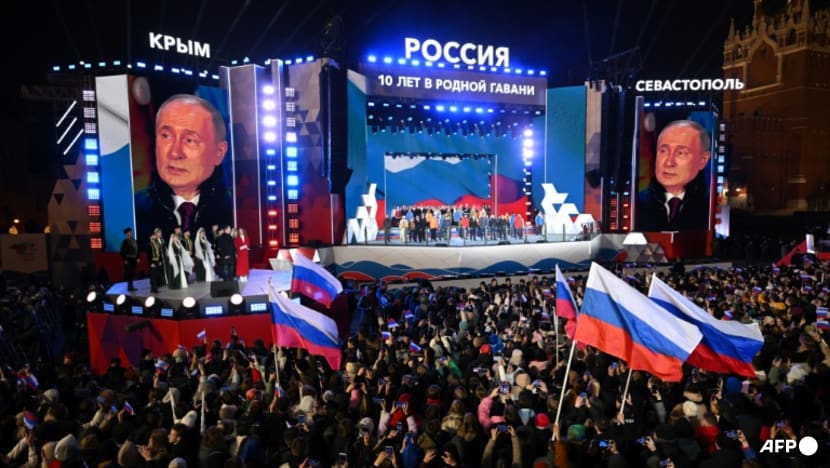Commentary: As Putin’s hostility towards the West grows, so does Russia’s reliance on China
In his next presidential term, Russian President Vladimir Putin will increase efforts to win the war in Ukraine and disrupt the Western liberal order, says Pusan National University’s Robert Kelly.

Russian President Vladimir Putin won a predictable victory in elections where he ran unchallenged. (Photo: AFP/Natalia Kolesnikova)

This audio is generated by an AI tool.
BUSAN, South Korea: Russian President Vladimir Putin won re-election on Sunday (Mar 17). He will rule another six years.
This outcome was never in doubt, of course. Mr Putin has long since subverted any meaningful democratic mechanisms in Russia. He is now the longest serving Russian ruler since Joseph Stalin.
At home, little will change. But abroad, Mr Putin is likely to increase his efforts to win the war in Ukraine and, more generally, to disrupt the Western liberal order.
CAN PUTIN WIN THE WAR ON UKRAINE?
Mr Putin’s legacy as a Russian leader is now deeply tied to the course of the Ukraine War. He is 71 years old; to successfully pass on the regime he has constructed will require ending the war on reasonably favourable terms which can be marketed as a success to his domestic public.
But he has struggled to do so while limiting the costs and disruptions at home. His new term may bring a change of course.
Mr Putin has already begun to shift the Russian economy to a full war footing. Russia’s defence industrial base is now producing huge volumes of drones, artillery shells and armoured vehicles.
Mr Putin has avoided full mobilisation of Russia’s manpower to forestall a middle-class backlash. But a growing need for infantry because of high battlefield losses may force his hand.
And 2024 is a window of opportunity for Mr Putin to finally win the war. Ukraine is running low on ammunition, because US Congressional Republicans are blocking US aid. Europe’s defence industrial production is only ramping up slowly to meet Ukraine’s needs.
If Donald Trump loses the US presidential election in the fall, and if European defence production continues to improve, Russia will face a much harder war next year.
DISTINCTLY ANTI-WEST
Mr Putin has charted a distinctly anti-Western course in the last decade, and that will likely accelerate in his new term. He clearly resents the post-Cold War settlement and no longer sees any means to revise it but force.
He now routinely makes oblique nuclear threats, and Putin associates have made vague threats about vulnerable North Atlantic Treaty Organization (NATO) members like the Baltics.
It is widely thought that if Mr Putin wins in Ukraine, he will force a crisis with an East European NATO member state to test the West’s response. The Baltics have a sizeable minority of Russian speakers. They may be a pretext.
If Joseph Biden is still US president at the time, any Russian probes of NATO will meet a harsh rhetorical response. And if they were to continue, the possibility of major nuclear crisis between the superpowers is substantial. Mr Biden will not back down. Mr Trump, however, may.
Mr Trump is uniquely fascinated with Mr Putin. He has already stated that he will give Ukraine no aid, bringing peace by forcing Ukraine to surrender.
Mr Trump also seems to want to withdraw from NATO. But even if he did not because of Congressional counterpressure, he could simply do nothing as Mr Putin attacked NATO’s eastern flank.
PUTIN NEEDS CHINA
As Mr Putin’s hostility toward the West has grown, so has Russia’s reliance on China. Mr Putin wishes to challenge the West, but his ability to do so is limited.
Russia’s economy is around 12 per cent the size of Western GDP. Russia can outproduce Ukraine, but it cannot compete with the West for long. Its conventional forces have fared poorly in Ukraine. It has suffered enormous losses in infantry and vehicles, which will require probably a decade to reconstitute.
Mr Putin’s aggressive foreign policy and war economy will also retard future Russian growth.
Wars are wasteful. Russian production dedicated to war goods creates opportunity costs and shortages elsewhere. Manpower lost in the war is labour removed from the economy. Western sanctions cut Russia off from traditional export markets and modern technologies.
Given these tough economic circumstances, Russia needs a major power partner. It needs to trade for goods it cannot produce at home, and it needs to sell its carbon reserves for foreign exchange.
Many states in the global South have rejected sanctions on Russia, but only China has the size and political sympathy necessary to defray Russian war costs. Chinese support is a must.
CHINA’S MIXED AND WARY RESPONSE
Chinese response to the war has been mixed and wary since the start. China clearly wants Russia to win. It appreciates the distractions and difficulties Russia makes for the world’s democracies.
For example, Russia’s invasion has provoked a major debate in the US over whether to confront Russia or China first. Without Mr Putin’s war, the US would be much more focused on China. Russia, like North Korea, is a useful spoiler for China, and China is happy to keep these states afloat for that reason.
Conversely, China needs Western market access and has not aligned openly with Mr Putin’s aggressive revisionism. The Western order Mr Putin loathes so much has powered Chinese growth for decades.
China runs regular trade imbalances, and these will likely continue as domestic consumption stays weak. The only countries with the wealth and willingness to absorb Chinese exports in volume are rich market democracies.
For this reason, market democracies should not decouple too rapidly from China. So long as Chinese growth is tied to the West, China will remain cautious of antagonising the democratic bloc. Domestic Chinese actors who profit from exports will resist Chinese hawkish policies and alignment with Russia.
On the other hand, if we de-link from both China and Russia simultaneously, we are pushing them toward each other and a new cold war.
Robert Kelly (@Robert_E_Kelly) is a professor of political science at Pusan National University.

















